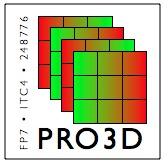Worst-Case Temperature Analysis for Real-Time Systems
Lothar Thiele, Iuliana Bacivarov, Jian-Jia Chen, Devendra Rai, Hoeseok Yang.
DATE, March 2011, Grenoble, France.
With the evolution of today’s semiconductor technology, chip temperature increases rapidly mainly due to the growth in power density. For modern embedded real-time systems, it is crucial to estimate maximal temperatures in order to take mapping or other design decisions to avoid burnout, and still be able to guarantee meeting real-time constraints. This paper provides answers to the question: When work-conserving scheduling algorithms, such as earliest-deadline first (EDF), rate-monotonic (RM), deadline-monotonic (DM), are applied, what is the worst-case peak temperature of a real-time embedded system under all possible scenarios of task executions? We propose an analytic framework, which considers a general event model based on network and real-time calculus. This analysis framework has the capability to handle a broad range of uncertainties in terms of task execution times, task invocation periods, and jitter in task arrivals. Simulations show that our framework is a cornerstone to design real-time systems that have guarantees on both schedulability and maximal temperatures.

